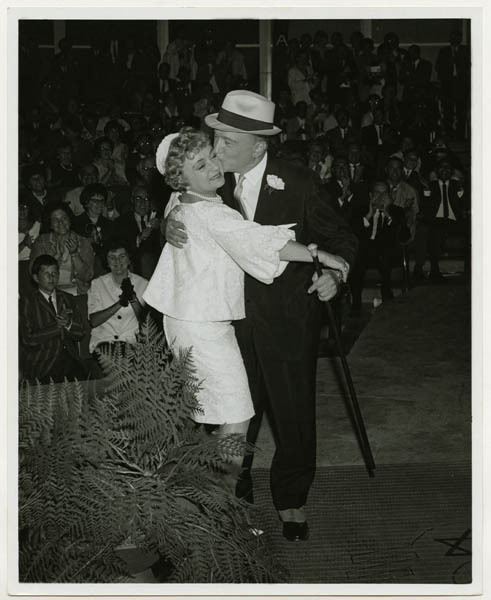With this post, we wrap up Sarah Ganton’s series on Molly Picon, for decades a household name in Yiddish theater and vaudeville, then a Broadway star and performer with the USO, then a radio personality. We’re very fortunate to have a rich record of her life through the archives of the American Jewish Historic Society, one of the five partners of the Center of Jewish History. Join us in celebrating this remarkable, vivacious and endlessly talented woman.

Molly Picon and Jacob Kalich on their 46th wedding anniversary, 19TK. [Link]
A relaxed life in the country at Chez Schmendrick proved a short-lived idea for Molly and Jacob, as they headed for Korea with yet another USO tour in December 1951. USO Camp Shows billed this one, completed around the Christmas Holiday, as “the most glamorous, talented, socko shows ever assembled…packed into a gayly wrapped package of entertainment goodwill for the US Forces.”
Molly toured Asia with Operation Star-Time, and was transported in a C-54 troop transport plane, issued clothes, utensils, and a steel helmet by the quartermaster—it was indeed a USO tour.
Though Molly wrote in her autobiography that she felt the lineup was skimpy and she worried about having enough material, she was a big hit, and found that “the thunderous applause of the troops, echoed by all America, will be your reward,” as the USO office had promised her when they wrote to invite her on the tour.
As she had on her World War II USO tours, Molly again collected the names and contact information of the families of Jewish soldiers she and Jacob encountered, then called their families when she got home to New York. The gratitude she received from these frazzled family members was immense. Mrs. Anna Friend wrote, “Dear Mollie, I am such a great admirer of yours…Thank you so much for being so nice to my boys, they told me you ate with them and all about you.” Similarly, Mrs. Gussie Insler wrote, “I don’t know how to express my gratitude for what you and all those in show business do to bring a little bit of home to all those lonely boys.”
Molly and Jacob got older, but by no means slower. Though they battled the problems of old age, they soldiered on in the pursuit of entertainment. Molly opened new plays on tour and on Broadway, including A Majority of One in London in 1960 and Milk and Honey in 1961. In both cases, as in many others, the plays got lukewarm reviews but Molly won raves.
She and Yonkel traveled to Israel often, as well as to Poland to shoot Fiddler on the Roof, in which Molly played Yente and Jacob had a small part as well. Molly played Frank Sinatra’s mother in Come Blow Your Horn, and Barbra Streisand’s in For Pete’s Sake. They were two But life inevitably runs its course, and thus the duo was fated to stop their frantic pace at some point.
Molly’s beloved Yonkel died at Chez Schmendrick on March 16, 1975 and Molly died in 1992, but both are remembered in the work that they did, both for the Yiddish theater and for the entertainment world in general. Molly was adored by nearly everyone she met and everyone who saw her perform, and her dedication to Yiddish theater was matched only by her husband. Indeed, Molly had that “ineffable quality which makes an audience sigh ecstatically and say ‘Isn’t she wonderful?’” as Louis Nizer so eloquently put it. We at the Center for Jewish History are lucky to have her papers, and I am lucky to have spent my internship getting to know her.
Sarah Ganton is a former intern at the Center for Jewish History.
